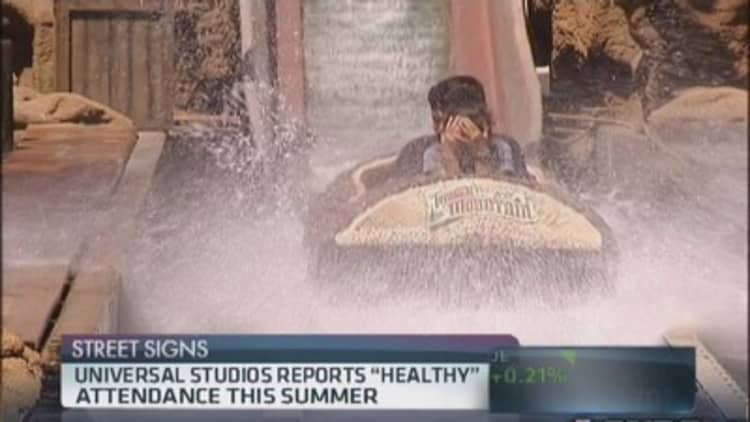The economy has been a roller coaster. Up and down, up and down—unless you've been investing in the theme park business, which has spent most of the year going up.
Most of these companies have been reporting record numbers. Disney's parks business was its fastest-growing segment last quarter, as attendance rose 3 percent and spending per customer rose 7 percent.
"I think this will be a record for Disney on the theme park performance," Matthew Harrigan at Wunderlich Securities said about the summer.
(More from Jane Wells: Farmers raisin' hell over 'Raisin Reserve')
Six Flags has reported record revenue this year, as has Cedar Fair Entertainment. Wells Fargo Securities released a report this week, "Theme Parks: Favorable August Weather Sets Up Solid Season Finale," with an emphasis on Cedar Fair as "best positioned."
Cedar Fair this week raised its full-year net revenue guidance based on a strong summer through Labor Day. In a statement, the company said that it remains on track for a fourth straight year of record results.
"Driving this year-over-year growth is a 5 percent increase in average in-park guest per capita spending to $44.10, and a 7 percent increase in out-of-park revenues to approximately $100 million," it said.
(More from Jane Wells: Don Mattingly on the reloaded, rejuvenated Dodgers)
Matt Ouimet, Cedar Fair's president and CEO, told CNBC, "I think people are still being very disciplined on how and where they spend their money, but once they get to the park, they've been spending it on food, they've been spending it on merchandise, they've been spending it on games."
All of this is happening as parks raise prices. Disney continues to see a return on investment in the year-old Cars Land at Disney California Adventure, and it is refurbishing the Magic Kingdom in Orlando, Fla. There are hints about new attractions in the future, and many hope the company will capitalize on its new ownership of Lucasfilm and the "Star Wars" franchise.

For the moment, though, Disney is taking a pause in spending, while Comcast-owned Universal Studios is doubling down. (Comcast is CNBC's parent company.)
Universal plans to expand the Harry Potter franchise and add attractions totaling more than $1 billion.
"Universal really has a lot of momentum," Harrigan said. "I think five years ago Universal got some overflow from Disney parks, and I think now it's almost like they're helping each other. ... They're more 'frenemies.' "
The only business coming up all wet is SeaWorld Entertainment, which reported a 9 percent drop in attendance last quarter. The company has blamed part of that on poor weather. Many analysts expect a better second half, but there are concerns that a new documentary about orcas in captivity could keep visitors away.
(More from Jane Wells: Farming gets its own 'Apple v. Windows' battle)
Still, overall, as Labor Day and summer recede, it's clear that Americans have been willing to make the big investment and spend a day, or a week, having some fun.
"I think the consumer is getting conditioned to $4 and change for gas," said Ouimet of Cedar Fair.
He is now preparing for the second-most important time of the year for theme parks: Halloween. For example, the company will add six new haunted mazes to transform Knott's Berry Farm in California into Knott's Scary Farm.
"You've got to remember 80 or 90 percent of the people are repeat visitors," Ouimet said. "They need something new."
—By CNBC's Jane Wells. Follow her on Twitter: @janewells


